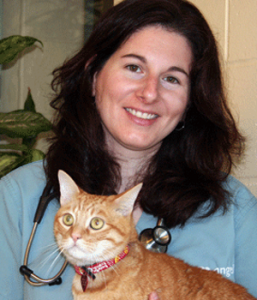-
Adopt
-
Veterinary Care
Services
Client Information
- What to Expect – Angell Boston
- Client Rights and Responsibilities
- Payments / Financial Assistance
- Pharmacy
- Client Policies
- Our Doctors
- Grief Support / Counseling
- Directions and Parking
- Helpful “How-to” Pet Care
Online Payments
Referrals
- Referral Forms/Contact
- Direct Connect
- Referring Veterinarian Portal
- Clinical Articles
- Partners in Care Newsletter
CE, Internships & Alumni Info
CE Seminar Schedule
Emergency: Boston
Emergency: Waltham
Poison Control Hotline
-
Programs & Resources
- Careers
-
Donate Now
 Mara Ratnofsky, DVM
Mara Ratnofsky, DVM
generalmedicine@angell.org
angell.org/generalmedicine
617-522-7282
Allergies are a common cause of recurrent skin and ear problems (itchiness, infections, redness, hair loss, etc.) in dogs and cats. Like people, a nimals can be allergic to a variety of things. An allergy to something in the diet is a fairly common cause of ear infections, foot licking, and stomach scratching in dogs. Cats with food allergies tend to have scabs and itchiness around the face and neck. Food allergies can arise at any age, and they can develop without a change in diet. Often animals who develop a food allergy have been eating a consistent diet for months or even years. The most common ingredients causing adverse food reactions in dogs are beef, dairy products, and wheat. In cats, beef, dairy products, and fish are the most common culprits. In addition to skin problems, food allergies can also cause gastrointestinal upset in some animals.
nimals can be allergic to a variety of things. An allergy to something in the diet is a fairly common cause of ear infections, foot licking, and stomach scratching in dogs. Cats with food allergies tend to have scabs and itchiness around the face and neck. Food allergies can arise at any age, and they can develop without a change in diet. Often animals who develop a food allergy have been eating a consistent diet for months or even years. The most common ingredients causing adverse food reactions in dogs are beef, dairy products, and wheat. In cats, beef, dairy products, and fish are the most common culprits. In addition to skin problems, food allergies can also cause gastrointestinal upset in some animals.
 Unfortunately there are no simple blood tests or skin tests that can be used to effectively diagnose a food allergy. Once other possible causes of itch (such as fleas, mange, seasonal allergies, etc.) have been ruled out, a hypoallergenic diet trial is implemented. The diet will either be hydrolyzed, meaning the ingredients are broken down into fragments that are too small for the body to recognize as allergens, or novel, meaning the protein is one which the pet hasn’t eaten before and therefore to which he or she isn’t already allergic. After an initial 1 week transition period, your pet should be fed nothing but the prescribed diet. Chewable medications (including heartworm preventative – talk to your veterinarian about alternatives for use during the trial), supplements, treats, flavored chew toys, rawhides, etc. all may cause your pet to react and therefore can interfere with testing.
Unfortunately there are no simple blood tests or skin tests that can be used to effectively diagnose a food allergy. Once other possible causes of itch (such as fleas, mange, seasonal allergies, etc.) have been ruled out, a hypoallergenic diet trial is implemented. The diet will either be hydrolyzed, meaning the ingredients are broken down into fragments that are too small for the body to recognize as allergens, or novel, meaning the protein is one which the pet hasn’t eaten before and therefore to which he or she isn’t already allergic. After an initial 1 week transition period, your pet should be fed nothing but the prescribed diet. Chewable medications (including heartworm preventative – talk to your veterinarian about alternatives for use during the trial), supplements, treats, flavored chew toys, rawhides, etc. all may cause your pet to react and therefore can interfere with testing.
The food trial should be maintained for a minimum of 8 weeks. If improvement is noted during that period, the options are to have the pet remain on the diet  indefinitely or to challenge the pet with different foods to see which cause a reaction. Often the first challenge is to restart the diet the pet was on immediately before the hypoallergenic trial was instituted. If the pet starts showing signs of allergy again (redness, scratching, hair loss, skin or ear infections), the hypoallergenic diet is resumed. Once allergy symptoms resolve, a single new ingredient can be introduced every 2 weeks. Once the offending foods have been identified, the goal will be to find a commercial diet that doesn’t contain them.
indefinitely or to challenge the pet with different foods to see which cause a reaction. Often the first challenge is to restart the diet the pet was on immediately before the hypoallergenic trial was instituted. If the pet starts showing signs of allergy again (redness, scratching, hair loss, skin or ear infections), the hypoallergenic diet is resumed. Once allergy symptoms resolve, a single new ingredient can be introduced every 2 weeks. Once the offending foods have been identified, the goal will be to find a commercial diet that doesn’t contain them.
For information about Angell’s General Medicine service, please visit www.angell.org/generalmedicine or call 617-522-7282.